“…real-world situations and authenticity appeal most to consumers between 35-54.”
Nielsen, November 2012

“Millennials put a premium on authenticity…”
Nielsen, August 2014

“…for brands looking to engage Gen Z, authenticity rules”
Adweek, May 2015
Gen X,Y, Zzz...
You needn’t be a futurist to predict whether a chorus of market research is going to announce the generation after Gen Z “craves authenticity”. They will.
And you can stop panicking about how the next generation is even more entrepreneurial and even more connected. If you try to delight consumers with insights attributed to groups of 80 million plus, you won’t get to know them very intimately <cough> Whole Foods’ millennial play <cough>.
Shocked to hear a trend firm advise against generational generalizations? Not if you read our November 2014 Trend Briefing POST-DEMOGRAPHIC CONSUMERISM (PDC), which outlined why the traditional demographic model of consumer behavior is broken. In it we said…
People – of all ages and in all markets – are constructing their own identities more freely than ever. As a result, consumption patterns are no longer defined by ‘traditional’ demographic segments such as age, gender, location, income, family status and more.
Four POST-DEMOGRAPHIC strategies
In last November's Trend Briefing we identified four areas of innovation opportunity in a POST-DEMOGRAPHIC world.
- NEW NORMAL: Embrace and celebrate new racial, social, cultural and sexual norms.
- HERITAGE HERESY: Be prepared to re-examine or even overturn your brand heritage.
- CROSS-DEMOGRAPHIC FERTILIZATION: Look to seemingly foreign or disparate demographics for inspiration.
- HYPER-DEMOGRAPHIC IRONY: Focus on ever smaller niches of interest rather than circumstance.
Let’s take a look at some recent examples of brands pursuing these four opportunities:
& Other Stories
Campaign's models and creative team are transgender
H&M-owned womenswear brand & Other Stories, from Sweden, cast transgender models in a campaign for its August 2015 capsule collection. The campaign’s creative team – including the stylist, makeup artist and photographer – were also transgender.
Eton
UK-based boarding school provides online courses specifically for Chinese students
From September 2015, Eton – the UK boarding school that was established in 1440 and that has educated 19 British Prime Ministers – will offer invitation-only online courses for students in China, tailored to fit the curriculums of their schools.
Public Dance Classics
App teaches people to dance like elderly Chinese women
Surpassing 50,000 downloads in May 2015, Public Dance Classics is an app inspired by public square dancing: a national phenomenon in China. The free mobile app enables anyone from any age group to learn the most popular dances, which are performed regularly by groups of older ladies in squares and other public places. Public Dance Classics features instructional videos for 30 dances, including 12 government-approved routines.
Lululemon & Vancouver's Stanley Park Brewing
Collaboration leads to limited edition beer for yoga enthusiasts
Lean Machine Ale, the post-workout beer from our PDC Briefing has not yet launched, but in July 2015, Lululemon partnered with Vancouver’s Stanley Park Brewing and produced 80,000 cans of Curiosity Lager, hitting the sweetspot for beer-loving yogis. The beers were available at the SeaWheeze Half Marathon, which has the motto: “Yoga. Run. Party. Repeat.”
We’ve come a long way from Bud Light’s take on yoga back in 2009…
BUT WAIT, THERE'S MORE!
Those strategies remain rich in opportunity, but now let’s examine three further POST-DEMOGRAPHIC IMPERATIVES. These underline why PDC is perhaps our most important trend yet, and why you urgently need it on your radar.
(i) The accelerating development of new technologies (from algorithms to big data to programmatic) gives brands the power to treat customers as the individuals they are, rather than as members of generic segments.
(ii) Continued urbanization means ever more people have the social freedom, economic means and diversity of product/service/experience choices they need to be themselves. Urbanites are your early adopters and your toughest critics. Meet their accelerating expectations or perish.
(iii) But remember, despite people’s heightening aspirations, there are still repressed groups who are ignored or purposefully sidelined by institutions and brands. Recognize them, and then empower them to be themselves.
Yes, we know it can be hard to throw off the demographic blinkers and see a more complex reality. But looking away is no answer.
THREE IMPERATIVES
Utilize the power of new technologies. Tackle the skyrocketing expectations of urbanites. Empower those who aren't able to pursue their identity. These POST-DEMOGRAPHIC IMPERATIVES insist you answer their call!
TASTE-LED TARGETING
Use technology to tailor your marketing, products and services so that no consumer experiences them the same way.

When NikeID launched in 1999 (yep, last century!), customization was a surprising, fun status play. Since then, it’s gone from ‘nice to have’ to vital. Consumers with POST-DEMOGRAPHIC expectations are accustomed to brands that speak to and serve them at a personal level.
The good news? The ability and POST-DEMOGRAPHIC imperative to target a ‘segment of one’ is finally becoming a real possibility, thanks to new technologies and the vast amounts of personal data that they’re spinning off. You must use this data and tailor your offering accordingly.
Not one of you is safe from this expectation. Bespoke offerings may come more easily to etailers or digital media providers (from Netflix to Spotify), but even physical products will soon evolve beyond customization at the moment of production (like these custom grip knives), to become rich, contextual, dynamic experiences* that are unique to the individual.
* Yup, all the trend buzzwords, but that’s where things are headed ;)

“Everyone’s instinct was, ‘Yeah, if you find out their age and gender data, that’s fantastic’. But what we learned is: it’s almost useless…”
Todd Yellin, VP of Product Innovation, Netflix

“…it’s not who they are in a superficial sense – like gender, age, even geography. It’s not even what they tell you. It’s what they do.”
Todd Yellin, VP of Product Innovation, Netflix
Spotify
Personal playlists delivered weekly to users
In August 2015, Spotify introduced Discover Weekly, a custom-made mixtape that is unique to each user and delivered each week. The playlists take Spotify users’ previous song selections and uses them to find tracks that have been played by other users with overlapping taste.
Axe
Online film changes to match viewer's interests
In August 2015, Axe debuted Romeo Reboot in Brazil, a short film that adapts to each online viewer’s interests (factoring music taste, previous purchases and more). There are a total of 100,000 variations of the advertisement that include changes to the music, the story and even the background, which can change from an office setting to a sci-fi one.
TAM Airlines
Airline produces personalized on-board magazines for each passenger
To celebrate the anniversary of its Milan – São Paulo route in May 2015, TAM Airlines created free personalized on-board magazines, Ownboard, for each passenger. The airline introduced a Facebook Connect request during the online purchase process in order to access information about passengers’ friends, likes, places and photographs. The information was used to generate customized content for each passenger; their name and photograph were on the front cover of the magazines placed in their seats.
Knewton
Personalized, adaptive learning platform is free to access
In August 2015, the education technology company Knewton opened up free access to its growing library of educational content and personalized learning software. Knewton adapts to each user so that once it is aware of a topic they wish to study, it supplies them with lessons tailored to their learning style and ability. When a teacher directs a class of students to learn a particular topic, each student can experience unique content (from video lectures to games) that moves at their own pace.
POST-DEMOGRAPHIC CITYSUMERS:
Urban-dwellers share passions, pain points, high expectations and a hunger for new offerings.

Cities are one of the central drivers of POST-DEMOGRAPHIC CONSUMERISM, and they are also where this trend finds its purest expression.
In large and rapidly growing cities, consumers can pursue the lifestyles they desire: not only are cities more permissive of tradition-eschewing pursuits than rural areas, they also provide access to a diverse range of products, services and experiences. Meanwhile, greater economic opportunities and higher incomes increase residents’ ability to pay for these lifestyles, and a competitive culture around collecting unique experiences enhances the desire for them.
The tribes within cities are delightfully diverse, yet there are common pursuits (for convenience, unique experiences, and for holistic self-improvement) and shared problems (congestion, pollution, time-constraints and stress) that can be catered to: by you!
Factory Fresh
Locally-sourced healthy meals delivered daily to customers' doorsteps
Launched in May 2015, Factory Fresh is a Beijing-based food delivery service that brings set menus to customers’ doorsteps every morning. The nutritionally-balanced meals are cooked to order using locally-sourced, market-fresh ingredients; calorie and nutritional information is available on the brand’s website. Factory Fresh’s set menus are priced at around CNY 360 – 500 (USD 56 – 80) per day.
Uber
On-demand massages available through app
In April 2015, Uber South Africa partnered with Massage on the Move to bring massages directly to customers’ homes in Johannesburg and Pretoria. To book, users simply pressed the UberRELAX button within the Uber app. Each booking included six 15-minute massages for customers and their friends or family members at a cost of ZAR 200 (USD 16.50). This follows Uber’s other array of urban services including lingerie deliveries in London, flower deliveries in Washington and free rides for presidential election voters in Warsaw and Krakow.
Public Transport Victoria
Commuters tap transport cards to donate to homelessness
In June 2015, Public Transport Victoria installed interactive billboards in train stations around Melbourne. Commuters were given the opportunity to donate to the homeless youth charity Ladder using their public transport card. By tapping the digital screen, the value of an individual ticket was sent directly to the charity.
Bybi
City residents invited to create ‘Bee Superhighway’
Launched in May 2015, the Pollinatorpassasjen (Bee Superhighway) is a project from Norwegian nonprofit Bybi. Designed to help bees thrive in Oslo’s center, the project invites the city’s inhabitants to contribute to the creation of a bee-supporting corridor. Oslo residents can help by planting flowers and by installing structures such as ‘hops hotels’. People can view contributions to the project online, or upload their own photos to help create an interactive map of the Pollinatorpassasjen.
POST-DEMOGRAPHIC EMPOWERMENT
We are still far from a world where every consumer can freely pursue their own identities. Bring this freedom to those who lack it.

There are billions of individuals around the world – from a female entrepreneur facing gender bias from investors, to an undocumented migrant in a new city – who face obstacles and are unable to pursue their desired lifestyles.
The causes of these restrictions, such as poverty, corruption or discrimination, vary wildly. But those facing obstacles still yearn for the POST-DEMOGRAPHIC freedom to choose their own lives – and it’s an IMPERATIVE that you listen and act!
People will celebrate brands that empower them to realize their aspirations. In some cases it’s as simple as your business paying attention to a section of society that is overlooked (by you and your competitors).
That’s right, we aren’t yet in a world of total POST-DEMOGRAPHIC CONSUMERISM. But you can get us closer, and build a better world – and a more powerful brand – in the process.
KPN
People from repressive countries able to virtually participate in gay pride parade
In August 2015, to allow gay individuals in repressive countries to “Experience the freedom of being your true self”, Dutch telecom provider KPN created a special canal boat for the Amsterdam Gay Pride Canal Parade. The boat carried 360 degree cameras that livestreamed the event to the Pridestream site, which had 67,984 visitors from 128 countries. Those participating in the parade remotely were able to share their own videos that were displayed on the sides of the canal boat.
LA Times
Newspaper hires journalist to cover Black Twitter
40% of 18-29 year old African American internet users use Twitter 12% more than the comparable figure for young white Americans. (Pew Research, January 2014).
In July 2015, The Los Angeles Times hired Dexter Thomas to cover Black Twitter and other online communities. While Black Twitter is too complex of a virtual community to label neatly, it is recognized as a community of highly-active Twitter users that is focused on social causes, pop culture, and issues faced by the black community in the US. Though the journalist’s first article on Black Twitter caused some backlash, the paper has been applauded for focusing on an online group that is often ignored by the mainstream media.
Always
Personal care brand’s educational program boosts girls’ confidence
In New York in July 2015, Always unveiled Always Global Confidence Teaching Curriculum: an educational program designed to encourage self-confidence and educate adolescent girls around the world. Building on the brand’s hugely impactful #LikeAGirl campaign, the program was developed after an Always study revealed that 72% of girls in the US experience loss of confidence during puberty. Created in partnership with nonprofit educational organization TED, the campaign includes the video, Always #LikeAGirl Unstoppable.
Alibaba and Blued
Competition brings Chinese LGBT couples to California to wed
In June 2015, seven Chinese same-sex couples were married at ceremonies in California. The couples took part in a competition hosted by Alibaba and Chinese LGBT dating app Blued, with the prize of a wedding and vacation in Los Angeles courtesy of the two companies. The winning couples were chosen by an online voting process on Alibaba’s shopping site. China does not recognize same-sex marriage or civil unions.
1,100+ companies and agencies (small & big) love our Premium Service
"The information in the Premium Service is really helpful to my work – planning market research and creating product concepts."
Dong Kwan Park Marketing Manager LG Electronics ["166"]
"trendwatching.com has been, and continues to be, my innovation encyclopedia, helping us to build an innovation network. It has been the foundation of idea shops that link consumer and new business opportunities. We’ve also used the report for innovation sessions, resulting in a high energy start of any of our strategy conferences."
Sharmila Martis Head of Knowledge Management Standard Chartered a:1:{i:0;s:3:"247";}










